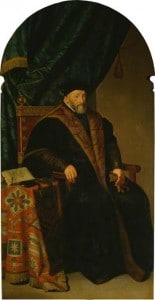
On 24th April 1536, two commissions of oyer and terminer were set up by Sir Thomas Audley, Lord Chancellor.
‘Oyer and terminer’ comes from the French ‘to hear and to determine’ and denotes a legal commission formed to investigate and prosecute serious criminal offences, such as treason, committed in a particular county. These particular commissions were for offences committed in the counties of Middlesex and Kent, and covered the crimes of misprision, treason, rebellion, felonies, murder, homicide, rioting, plotting, insurrection, extortion, oppression, contempt, concealment, ignorance, negligence, falsities, deception, conspiracy and being an accessory to these crimes. It is not known whether they were set up specifically to try the men who would later be charged with committing adultery with Queen Anne Boleyn, but they were used for that purpose.
You can read more about the setting up of these commissions in my article 24 April 1536 – The Legal Machinery is Set Up.
Claire, I am glad that you are including Thomas Audley in the history of Anne Boleyn’s fall. For whatever the reason, perhaps the magnificence of Thomas Cromwell, he is far too often left out of the history of the period. That is highly unfortunate, as Audley’s contributions to the Tudor story of the 1530’s and 1540’s are highly significant.
I find something that Eric Ives points out highly significant: these commissions were generally set up *after* the arrests were made.
The strongest “evidence” against Anne, besides Mark Smeaton’s confession, her conversation with Smeaton and Norris happened only in the last days of April.
So what was the “evidence” when the commissions were set up? What some of her ladies had told?
Hi there, I’m reading John Schofield’s ‘Rise & Fall of TC’ and on the 24 April commission he writes: This is a curious document……No allegations of the queen’s infidelity had yet been reported. The most probable answer in the context is that Henry, Cromwell and now Audley were preparing the ground in the more than likely event that Anne would not go meekly. Under existing legislation her refusal to surrender her crown would not be treason – but it could be made treason if the right laws were hurriedly passed and the judicial machinery put in place.” Now there’s an interesting thought. What do you think?
I’ve been pondering all this, as I do on a yearly basis, and I think that Cromwell hadn’t completely sorted out what he was going to do about Anne but thought that she might cause trouble and so had Audley set these up. I think the fact that Anne then spoke to her chaplain Matthew Parker on 26 April, saying something about looking out for Elizabeth, shows that she’d got wind that something was up or that she’d been approached about an annulment. I don’t believe she had any clue how bad things would get, I suspect she thought she’d be banished like Catherine.